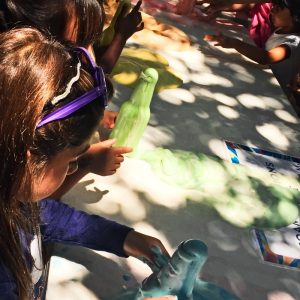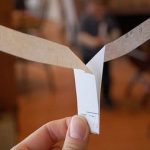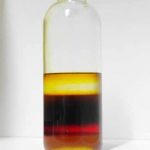Blog
Science at Home: Rainbow Eruptions
Simple at-home science – 2 kinds of rainbow eruptions! Try one or both.
(To see more from CuriOdyssey’s At-Home Science online science resources that include virtual classes, videos of experiments and CuriOdyssey’s wildlife, live events, kits and more, visit CuriOdyssey At-Home Science HERE.)

Rainbow “Elephant’s Toothpaste”
The Mentos Method
Source: Scientific American describes the tried and true method well, with some variation testing (i.e. crushed candies vs whole). At CuriOdyssey, we cut out a few steps and stuck with whole Mentos and different kinds of colorful sodas to get a rainbow eruption!
“Materials:
- Wax paper
- Cutting board
- Knife
- One roll of Mentos (at least eight candies)
- Two index cards
- Tape
- Two two-liter bottles of Diet Coke
- An outdoor area at least two meters from buildings
- Eye protection (safety goggles or glasses)
- Video camera with either a tripod or a helper to take the images (optional)
Preparation:
- Place a piece of wax paper on top of the cutting board. On the wax paper, carefully use a knife to crush and cut four Mentos candies into many small pieces. An adult may help you cut up the candies.
- Make a Mentos cartridge to hold the candies for you before you drop them into the Diet Coke bottle by rolling an index card into a tube, slightly larger than the diameter of a Mentos candy. Tape the tube together on the side.
- Be sure to wear eye protection when putting the candies into the cola!
- Wear clothes that you would not mind if they get splashed with a little soda pop—this activity can get a little messy!
Procedure:
- Place a Diet Coke bottle in an outdoor area, at least two meters from any buildings or anything hanging above the area, such as eaves, overhangs or wires. Make sure that the bottle is on a level surface and stably standing straight.
- If you want to videotape the reactions, set up the video camera so that it has in its viewfinder the bottle and a height equivalent to at least the first story of a building.
- Carefully remove the cap from the soda bottle and place the flat index card on top, covering the hole.
- Add four whole Mentos candies to your cartridge, put on your eye protection, and start the video camera.
- Place your full cartridge on top of the flat index card. Line up where the opening of the bottle is with the opening of your cartridge. Quickly pull out the flat index card, releasing the Mentos candies into the bottle. Then step back without tipping the bottle over or disturbing the reaction.
Background:
A carbonated beverage is packed full of dissolved carbon dioxide gas, which forms bonds with water. While the soda is in the bottle, the gas is kept in solution by the bottle’s pressurized conditions. When you pour some soda into a glass, some gas escapes and forms foam, but most stays trapped by the surface tension of the water. But all those gas bubbles want to escape, making it no wonder that soda makes you burp!
To create bubbles, the carbon dioxide needs to interact with itself, which means that the carbon dioxide’s bonds with water in the Diet Coke must be broken. A Mentos candy can help with this. Although the candy may look smooth, if you looked at it under a microscope you’d see tiny bumps coating its entire surface. This rough surface allows the bonds between the carbon dioxide gas and the water to more easily break, helping to create carbon dioxide bubbles and cause the classic eruption. The speed at which the Mentos falls through the soda can affect how large the eruption is, and this can be tested by comparing whole with crushed Mentos, the latter of which are less dense.”
Rainbow “Elephant’s Toothpaste” (not edible, though)
Source: thanks Scholastic! We tested this experiment and it was a crowd pleaser.
“What You’ll Need:
- A clean 16-oz plastic soda bottle
- CuriOdyssey used 12oz glass soda bottles to avoid plastic.
- 1/2 cup 20-volume hydrogen peroxide liquid (20-volume is a 6% solution, ask an adult to get this from a beauty supply store or hair salon)
- CuriOdyssey used 40-volume hydrogen peroxide diluted with a bit of water (roughly 2 parts H2O2, 1 part H2O) to make it less thick and easier to react. Salon peroxide is much thicker than the drugstore kind, but that also works.
- 1 Tablespoon (one packet) of dry yeast
- 3 Tablespoons of warm water
- Liquid dishwashing soap
- Food coloring
- Small cup
- Safety goggles
What To Do:
1. Hydrogen peroxide can irritate skin and eyes, so put on those safety goggles and ask an adult to carefully pour the hydrogen peroxide into the bottle.
2. Add 8 drops of your favorite food coloring into the bottle.
3. Add about 1 tablespoon of liquid dish soap into the bottle and swish the bottle around a bit to mix it.
4. In a separate small cup, combine the warm water and the yeast together and mix for about 30 seconds.
5. Now the adventure starts! Pour the yeast water mixture into the bottle (a funnel helps here) and watch the foaminess begin!
What’s Happening:
Foam is awesome! The foam you made is special because each tiny foam bubble is filled with oxygen. The yeast acted as a catalyst (a helper) to remove the oxygen from the hydrogen peroxide. Since it did this very fast, it created lots and lots of bubbles. Did you notice the bottle got warm? Your experiment created a reaction called an exothermic reaction, which means it not only created foam, it created heat! The foam produced is just water, soap, and oxygen, so you can clean it up with a sponge and pour any extra liquid left in the bottle down the drain.
The experiment can also be done with the hair care version of hydrogen peroxide, or the weaker pharmacy version, although the effect with the pharmacy version will be smaller. Readers should use safety goggles for any experiment, and should have parents read instructions on containers for safety precautions.”
Tag us in your trials! Find us online. #CuriOdyssey #FamilyFun #SciencePwr
Join the CuriOdyssey Community
LOCATION
1651 Coyote Point Drive
San Mateo, CA 94401
Ohlone Land Acknowledgement
650-342-7755
info@curiodyssey.org
CuriOdyssey is a 501(c)(3) non-profit, Tax ID 94-1262434




